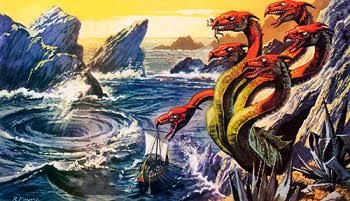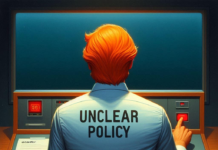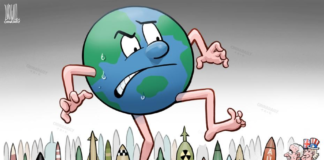MARKET PERSPECTIVE
By J Mulraj
March 11-17, 2023
Jerome Powell’s dilemma to raise or not to raise, interest rates
In Greek mythology, Odysseus had to pass in narrow waters between two monsters named Scylla and Charybdis. The phrase, ‘between Scylla and Charybdis’ symbolizes the dilemma of avoiding risk at the cost of doing wrong. That is the dilemma which Fed Chairman, Jerome Powell faces, on whether or not to raise interest rates, aggressively.
Before the banking crisis triggered by Silicon Valley Bank (SVB), Fed Chairman Jerome Powell had indicated his willingness to stay the ‘hike interest rates’ course in order to tame inflation, and had hinted that the peak rate may be higher than he had earlier indicated. A hike of 50 basis points, 0.5%, was expected at the meeting, next week.
SVB, founded in 1983, had become the 16th largest bank in USA, before it succumbed to a run last week. Startup companies were its deposit customers. Startups receive rounds of funding from Venture Cap funds (VCs) and deposit these funds in banks, to use, or ‘burn’ over time. Thanks to Quantitative Easing, or QE, VCs funded more startups, and, in two years to mid 2022 SVB received some $140 b. of deposits. It needed to invest this money, and did so in long dated T Bills which then offered better rates.
So here’s the genesis of the problem, and the lessons therefrom:
> QE distorted the value of money, thereby lowering the cut-off rates of expected returns on startups, funding more of them. Since rates would surely rise from the near zero levels, this, essentially, set up a problem for the ability to raise future rounds of funding.
> SVB did not manage its asset-liability mismatch. Its deposits, or liabilities, were short term, payable on demand. Its assets (the T Bills) were long term. So, when customers asked for their money, SVB was compelled to sell T Bills held as ‘available for sale’ and had to incur a sizable loss. The loss arose because the Fed raised interest rates aggressively, to counter inflation. Bond prices move in the opposite direction to interest rates. Prices fall when rates rise.
> Banks investing in T Bills/mortgage backed securities have to classify them either as ‘Held To Maturity’ or as ‘Available for Sale’. HTM bonds don’t need to be marked to market, as the bank intends to hold them to maturity, when they get paid fully. AFS need to be marked to market, to reflect their current valuation in the accounts. Bank regulators need to monitor ‘mark to market’ valuations even for HTM, to avoid a repeat of this situation.
> The authorities have managed to stanch the problem, for now. Federal Deposit Insurance Company, the body which guarantees deposits up to $ 250,000 per depositor, has created a fund, which will offer to lend, against the full value of the bonds held by banks, thus ensuring depositors get 100% of their deposits back (not just $ 250,000). This has helped calm nerves, for now. It does, however, create a moral hazard, which is this. Why should anyone be careful to look at a bank’s soundness if he is assured full safety of deposits? Would he not simply chose the one offering the highest interest? Would banks not compete to reach the lowest common denominator?
Crises in the banking industry are inevitable because of the structure of the industry. As per Basel 3 norms, banks are required to have a capital adequacy ratio of 8%. RBI has imposed a CAR of 9% for private banks and 12% for PSU banks. So banks are, by design, borrowing more. They have, and always will, an asset-liability mismatch.
Now a global bank, Credit Suisse, has seen its share price drop sharply, over 30%, after its largest shareholder, Saudi National Bank, stated it would not subscribe to more equity. This is truly ironic. Credit Suisse lent using ESG (Environment Society and Governance) norms, and in 2021 had a score of 73/100 in Environment. Oil drilling falls under E. So perhaps it may have denied funding for further oil exploration. So it is ironic that now Saudi, the biggest oil producer, has denied it funding. The Swiss National Bank has offered to lend it $ 54b.
The fall of SVB and NY based Signature Bank, has wiped out $1 b. equity investments in them made by the largest Swedish pension fund, Alecta. Swedish media and politicians have not, though, sought a JPC inquiry as Indian ones did, for LIC investments in Adani. The Swedes are mature.
Other European banks like BNP Paribas and Deutsche have also seen their stock prices fall. One hopes there is no contagion, but it is becoming likely.
So J. Powell faces a Scylla and Charybdis dilemma. At the Fed meeting next week, should he raise rates, maybe by 50 bps, in order to tame inflation (6% latest figure)? Or, after seeing the panic in the banking system, should he avoid entering dangerous waters by deferring the hike? It’s tough decision, a lose-lose one.
Easy, low cost, money because of QE has led to bad decisions. Cigarette maker Altria, earlier Philip Morris, bought a 35% stake in Juul Labs (an electronic cigarette company), in end 2018, for $12.8 b. On March 3, Altria exchanged the entire 35% stake in Juul for a non exclusive license to some of Juul’s heated tobacco intellectual property. So Altria’s purchase, made with low cost QE funding, was wiped out 98%, simply because money was available. The loss equalled about 2 years’ of Altria profits. Altria produces 100 b. cigarette sticks a year. In effect, in order to make up for a terrible investment decision, Altria used 200 m. cigarettes, affecting God knows how many lives, with potential cancer.
In the geopolitical arena there is an important development. Under Chinese stewardship Iran and Saudi Arabia have agreed to normalize relations. One hopes this will lead to easing of tensions in other countries in the region, like Yemen, Syria, Lebanon and others. China has displayed political heft in getting them to agree.
China might have an economic plan, to get these two countries to finance a pipeline to carry crude oil from both to China, via Turkmenistan, Uzbekistan and Tajiistan/Kyrgystan. For China that would be a way to avoid the choke point of crude traveling by sea, the Strait of Malacca.
Last week the BSE Sensex dropped 1146 points to end at 57989.
The banking crisis isn’t over, nor is the interest rate raising exercise. J. Powell may pause, perhaps, but even if he did, the upcycle would continue later. Should more panic spread to other banks, global stock markets would fall further. Alas, this looks probable.
Picture Source: https://tvtropes.org/pmwiki/pmwiki.php/Main/ScyllaAndCharybdis
Responses may please be mailed to Jmulraj@asiaconverge.com










































COMMENTS